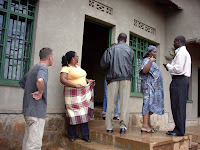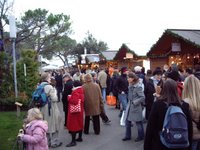
I always hesitate when people ask me what I do, and no less so than at the airport when that piece of beaurocratic paper asks me to state my profession. Titles like "Programme Assistant" don't give any idea of what the job entails. I recently had the idea of writing "Peace Worker" and it sits nicely with me. Identifying myself as a Peace Worker gives an impression of the sort of work I tend to be involved in without limiting it to a definition of paid employment or to focussing solely on the academic or solely on the practical.
So, what have I been doing recently? Last weekend I facilitated an Alternatives to Violence workshop which was, as always, both inspiring and exhausting. I have been reading up on Australia's peacebuilding work in the Pacific, and have been pleased to find that some of the research and advocacy I was doing in Geneva is also happening here. I have also been getting interested in and helping out with Quaker development work here in Australia. I have been following up on projects I was involved with in Kenya, and am very excited to hear that AVP might be part of a new peace project in Nepal all because I was able to link some people up with each other. I have also been putting together some fun African fabrics in order to make a patchwork skirt which will remind me of Kenya. So I suppose at the moment I'm literally doing bits and peaces, and the label of Peace Worker fits well.
So, what have I been doing recently? Last weekend I facilitated an Alternatives to Violence workshop which was, as always, both inspiring and exhausting. I have been reading up on Australia's peacebuilding work in the Pacific, and have been pleased to find that some of the research and advocacy I was doing in Geneva is also happening here. I have also been getting interested in and helping out with Quaker development work here in Australia. I have been following up on projects I was involved with in Kenya, and am very excited to hear that AVP might be part of a new peace project in Nepal all because I was able to link some people up with each other. I have also been putting together some fun African fabrics in order to make a patchwork skirt which will remind me of Kenya. So I suppose at the moment I'm literally doing bits and peaces, and the label of Peace Worker fits well.

















 After all these years, I still struggle with how to respond to people asking me for money. Whether it's a street child selling over-priced tissues in Luxor, Egypt or some of the local characters in Glebe needing a few bucks to visit family - I never seem to get it quite right.
After all these years, I still struggle with how to respond to people asking me for money. Whether it's a street child selling over-priced tissues in Luxor, Egypt or some of the local characters in Glebe needing a few bucks to visit family - I never seem to get it quite right.




















